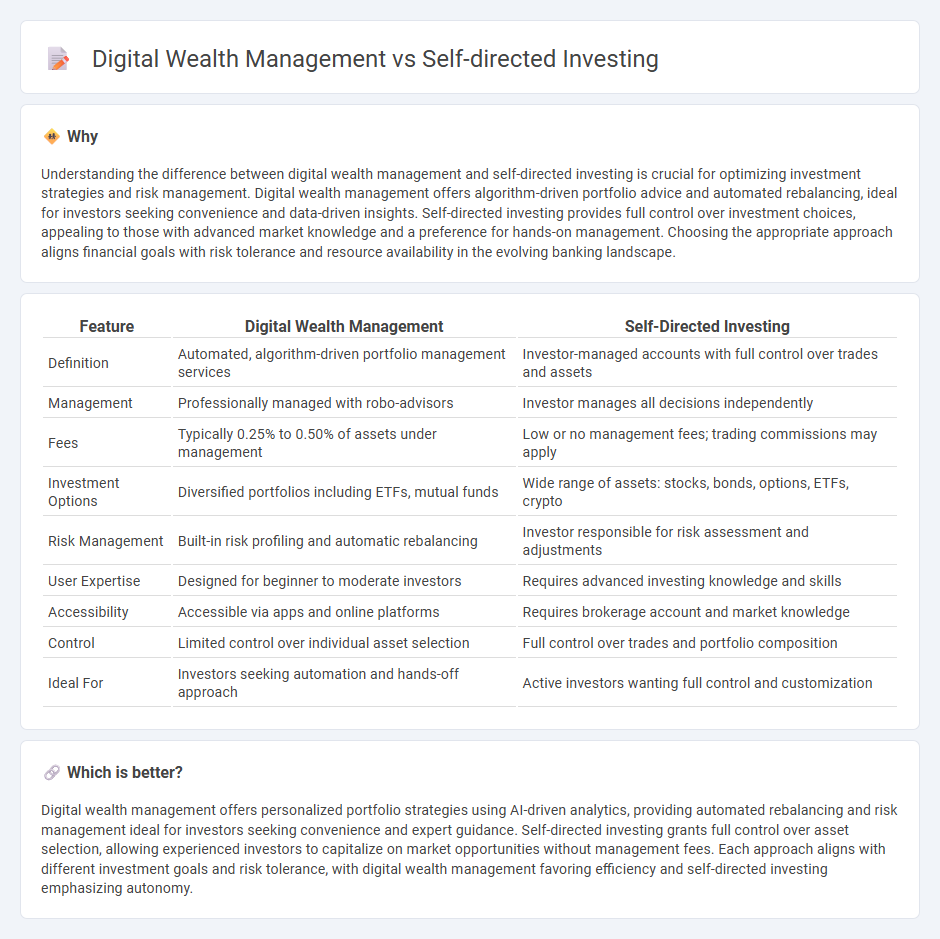
Digital wealth management platforms employ advanced algorithms and AI to provide personalized investment strategies and portfolio optimization, offering convenience and automated risk management. Self-directed investing allows individuals full control over their investment decisions, but requires higher financial knowledge and active portfolio monitoring. Explore the benefits and challenges of both approaches to determine the best fit for your financial goals.
Why it is important
Understanding the difference between digital wealth management and self-directed investing is crucial for optimizing investment strategies and risk management. Digital wealth management offers algorithm-driven portfolio advice and automated rebalancing, ideal for investors seeking convenience and data-driven insights. Self-directed investing provides full control over investment choices, appealing to those with advanced market knowledge and a preference for hands-on management. Choosing the appropriate approach aligns financial goals with risk tolerance and resource availability in the evolving banking landscape.
Comparison Table
| Feature | Digital Wealth Management | Self-Directed Investing |
|---|---|---|
| Definition | Automated, algorithm-driven portfolio management services | Investor-managed accounts with full control over trades and assets |
| Management | Professionally managed with robo-advisors | Investor manages all decisions independently |
| Fees | Typically 0.25% to 0.50% of assets under management | Low or no management fees; trading commissions may apply |
| Investment Options | Diversified portfolios including ETFs, mutual funds | Wide range of assets: stocks, bonds, options, ETFs, crypto |
| Risk Management | Built-in risk profiling and automatic rebalancing | Investor responsible for risk assessment and adjustments |
| User Expertise | Designed for beginner to moderate investors | Requires advanced investing knowledge and skills |
| Accessibility | Accessible via apps and online platforms | Requires brokerage account and market knowledge |
| Control | Limited control over individual asset selection | Full control over trades and portfolio composition |
| Ideal For | Investors seeking automation and hands-off approach | Active investors wanting full control and customization |
Which is better?
Digital wealth management offers personalized portfolio strategies using AI-driven analytics, providing automated rebalancing and risk management ideal for investors seeking convenience and expert guidance. Self-directed investing grants full control over asset selection, allowing experienced investors to capitalize on market opportunities without management fees. Each approach aligns with different investment goals and risk tolerance, with digital wealth management favoring efficiency and self-directed investing emphasizing autonomy.
Connection
Digital wealth management platforms provide automated, algorithm-driven investment advice while enabling seamless access to self-directed investing tools, empowering investors to customize portfolios with greater control. Integration of advanced analytics and user-friendly interfaces enhances decision-making, bridging professional financial guidance and independent investment strategies. This synergy accelerates portfolio diversification, risk management, and cost efficiency in the evolving digital banking landscape.
Key Terms
Autonomy
Self-directed investing empowers individuals to make independent decisions, control their portfolios, and avoid intermediary fees, offering unmatched autonomy in financial management. Digital wealth management combines algorithm-driven insights with personalized guidance, streamlining investment strategies while maintaining some level of client control. Explore how these approaches balance autonomy and support to optimize your investment journey.
Robo-advisors
Robo-advisors offer automated portfolio management using algorithms, providing a cost-effective alternative to traditional self-directed investing by reducing the need for manual market analysis and decision-making. These digital wealth management platforms utilize data-driven strategies to optimize asset allocation, risk assessment, and rebalancing, enhancing investment efficiency and accessibility for users. Explore comprehensive insights on how Robo-advisors transform investment approaches and improve portfolio outcomes.
Portfolio customization
Self-directed investing offers maximum portfolio customization, allowing investors to select individual stocks, bonds, and ETFs according to their specific risk tolerance and financial goals. Digital wealth management platforms use algorithms and AI to create personalized portfolios based on investor profiles but typically provide less granular control over asset selection. Explore how these two approaches compare to find the best fit for your portfolio customization needs.
Source and External Links
Self-Directed Investing by First Citizens Investor Services - Offers commission-free trading on US listed stocks and ETFs with no minimum balance requirement to open an account.
What is Self-Directed Investing? | U.S. Bancorp Investments - Allows DIY investors to manage and trade stocks, mutual funds, ETFs, and options directly online.
What is Self-Directed Investing - and is it right for you? - Involves managing a portfolio of investments independently without relying on a financial advisor, offering flexibility and cost efficiency.
 dowidth.com
dowidth.com